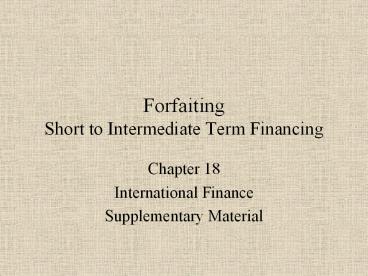Forfaiting Short to Intermediate Term Financing
1 / 5
Title:
Forfaiting Short to Intermediate Term Financing
Description:
... Pricing Discount Rate: LIBOR plus margin Days of Grace: cover b-days until settlement Commitment Fee: ~ to cover exposure days Benefits: ... – PowerPoint PPT presentation
Number of Views:2
Avg rating:3.0/5.0
Title: Forfaiting Short to Intermediate Term Financing
1
ForfaitingShort to Intermediate Term Financing
- Chapter 18
- International Finance
- Supplementary Material
2
FORFAITING (Medium-Term Capital Goods Financing)
- Forfaiting means selling a bill of exchange, at a
discount, to a third party, the forfaiter. - The forfaiter collects the payment from an
overseas customer, through a collateral bank(s) - The forfaiter assumes the underlying
responsibility of exporters and simultaneously
providing trade finance for importers by
converting a short-term loan to a medium term
one. - Forfaiting is the discounting of international
trade receivables on a without recourse basis.
3
FORFAITING (Medium-Term Capital Goods Financing)
- Characteristics
- The exporter extends credit for period ranging
between 180 days to 7 years. - Minimum bill size should be US 250,000 (US
500,000/- is preferred) - The payment should be receivable in any major
convertible currency. - A Letter of Credit, or a guarantee by a bank,
usually in importer's country. - The contract can be for either goods or services.
4
FORFAITING (Medium-Term Capital Goods Financing)
- Documentation
- At its simplest, the receivables must be backed
by any of the following debt instruments - Promissory Note ( a note payable)
- Bill(s) of Exchange
- Deferred payment letter of credit
- A bank letter of guarantee
5
FORFAITING (Medium-Term Capital Goods Financing)
- Pricing
- Discount Rate LIBOR plus margin
- Days of Grace cover b-days until settlement
- Commitment Fee to cover exposure days
- Benefits
- Eliminates risks like political, transfer and
commercial risks - Enhances competitive advantage.
- Ability to provide vendor financing making
products more attractive - Enables the exporter to do business in risky
countries. - Increases cash flow. Forfaiting converts a
credit-based transaction in to a cash transaction.

